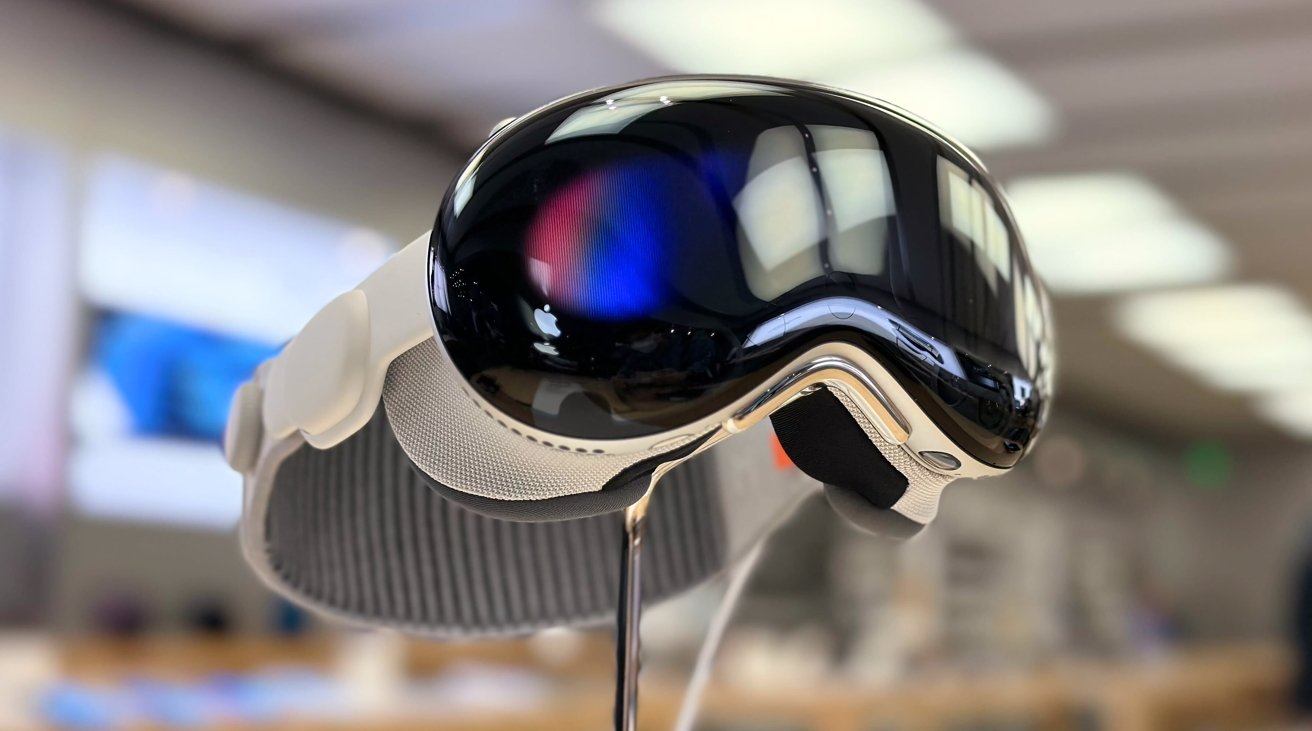Morgan Stanley dubs Apple Vision Pro a 'free call option on spatial computing'
Wowed by their experience with Apple Vision Pro, analysts at investment bank Morgan Stanley see "immense" long-term potential for the Spatial Computing headset that Wall Street has yet to fully appreciate.

Apple Vision Pro in an Apple Store.
In its first weekend of availability, the Apple Vision Pro received considerable interest from early adopters and industry observers alike. Among them were members of Morgan Stanley's AAPL equity research team who spent a full three days immersed in device's world of spatial computing, having an eye-opening experience that left them jazzed up about its future.
"The long-term potential of the Vision Pro is immense, and against low investor expectations," analyst Erik Woodring said, adding that the success of the device and its successors are "effectively a free call option on Apple innovation."
In particular, the analyst is bullish on the Vision Pro's prospects to mature into a desirable productivity tool for consumers while serving a variety of interest within the enterprise, such as remote training, digital showrooms and in-field remote repairs. Others have lauded potential use cases in surgical, construction and industrial applications.
For the time being, Woodring sees content consumption serving as the Vision Pro's "killer app." He was duly impressed by the clarity and sharpness of its dual displays, which are "incredible" and make you feel like you are have teleported yourself into the environment you're watching.
"It's an entirely new way of consuming content, and is as close to the 'real world' as you can get without physically being there," he said.
In general, his team found experiences of roughly 30 minutes in a mixed-reality setting to be most preferable. Ultimately, he sees the device emerging as a "content powerhouse" with the advent of live sports, graphic-intensive flicks, and mixed-reality games on its platform.
At $3,500 plus tax, Apple Vision Pro certainly isn't for everyone. It's not sharable, has some pixelation issues around the periphery, and will require a physical Bluetooth keyboard to actually be productive in its current incarnation.
Woodring expects these limitations to be addressed as the product matures, believing there's "immense" potential for upside surprise to Apple's bottom line over next three to five years.
Morgan Stanley reiterated its overweight rating and $220 price target on shares of AAPL. The stock is up a fraction of a percent to $188.32 in afternoon trading on the NASDAQ.
Read on AppleInsider


Comments
I have NEVER seen as many journalists, reviewers, etc. focus on the positives and potentials of an Apple product!
Instead of the norm reporting that focus on the negatives and how the product is a failure. This time they explicitly stating they instead understand that this is a Gen 1 product and that the negatives will eventually be resolved going forward.
I would not allow myself to be quoted saying what is obvious about most every product made.
As a contrast, Meta's Reality Labs division has never made $4b per year. Here's Reality Labs' financial performance:
This is amazing, and speaks to Zuckerberg's absolutely control of Meta. That operating loss line continues to scale with the revenue line. This implies that if Meta sells more Quest units, they will have more operating losses. IOW, for every Quest sale they have at $500, they lose about $2500.
A normal CEO would have stopped this a year ago, at least. That loss line has to stop getter bigger. There has to be projections in Meta when the Quest ecosystem can pay for itself, and it looks very far away.
Would be interesting to see what the AVP financials are like.
All 3 companies then make a lot of revenue and more profit as a cut of game and digital goods sales on their respective platforms have like 90% margins. The revenue from both hardware and software is then enough to pay for development of the next versions of the hardware and software. All 3 companies make profits from their gaming divisions.
Meta is not using the game console strategy as the game console vendors don't sell their hardware as loss leaders. What Meta is doing is dumping hardware onto the market, buying out all the developers and publishers, and choking out any competitors. Then some time in the future, there will be enough users to monetize. Lots of question marks on that.
Is there a path for Meta's headset software to make enough revenue to pay off hardware loss and R&D? I don't think they know. The plot of Meta Reality Labs' financial doesn't show a bend in the curve for losses, so they are not making enough money on software to dent the hardware and R&D spend yet. For 2023, Meta Reality Labs has an operating loss of $16b. 16 billion dollars. What are they spending the money on?
Watching videos, movies, streaming (for things covered) it is fantastic. Better than any TV I have ever owned. For immersive and 3D it is amazing.
For games, we will see. I am not a gamer BUT have played some VR on a Meta and don't see, with this technology Apple approaching that experience but it is early.
As a spatial computer, until Apple gets this typing nonsense down, no way. It took me 10 minutes to get a password into Disney. This is a nightmare. If you need to use a physical keyboard this is a non-starter. This needs a complete revamping as this sucks.
Scrolling, setting up windows and the whole experience is pretty good.
So, while early on, there are some big hits, there are some serious flaws especially in the computing aspect of the device, particularly the virtual keyboard that needs some major changes.
“ … there's "immense" potential for upside surprise to Apple's bottom line over next three to five years. “
So, what’s the compelling reason to jump on board the Vision Pro train prior to when it really starts to deliver on some of these greater promises?